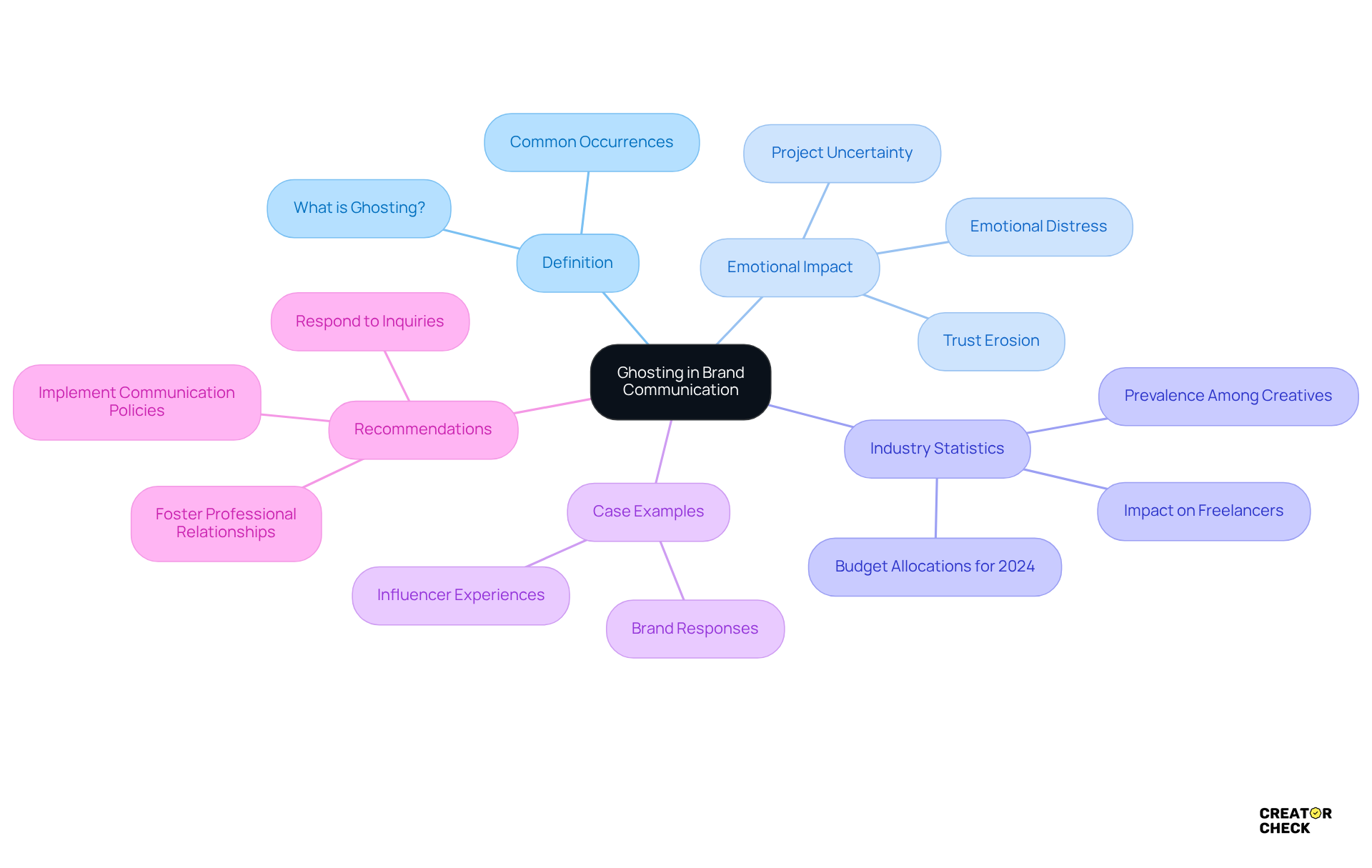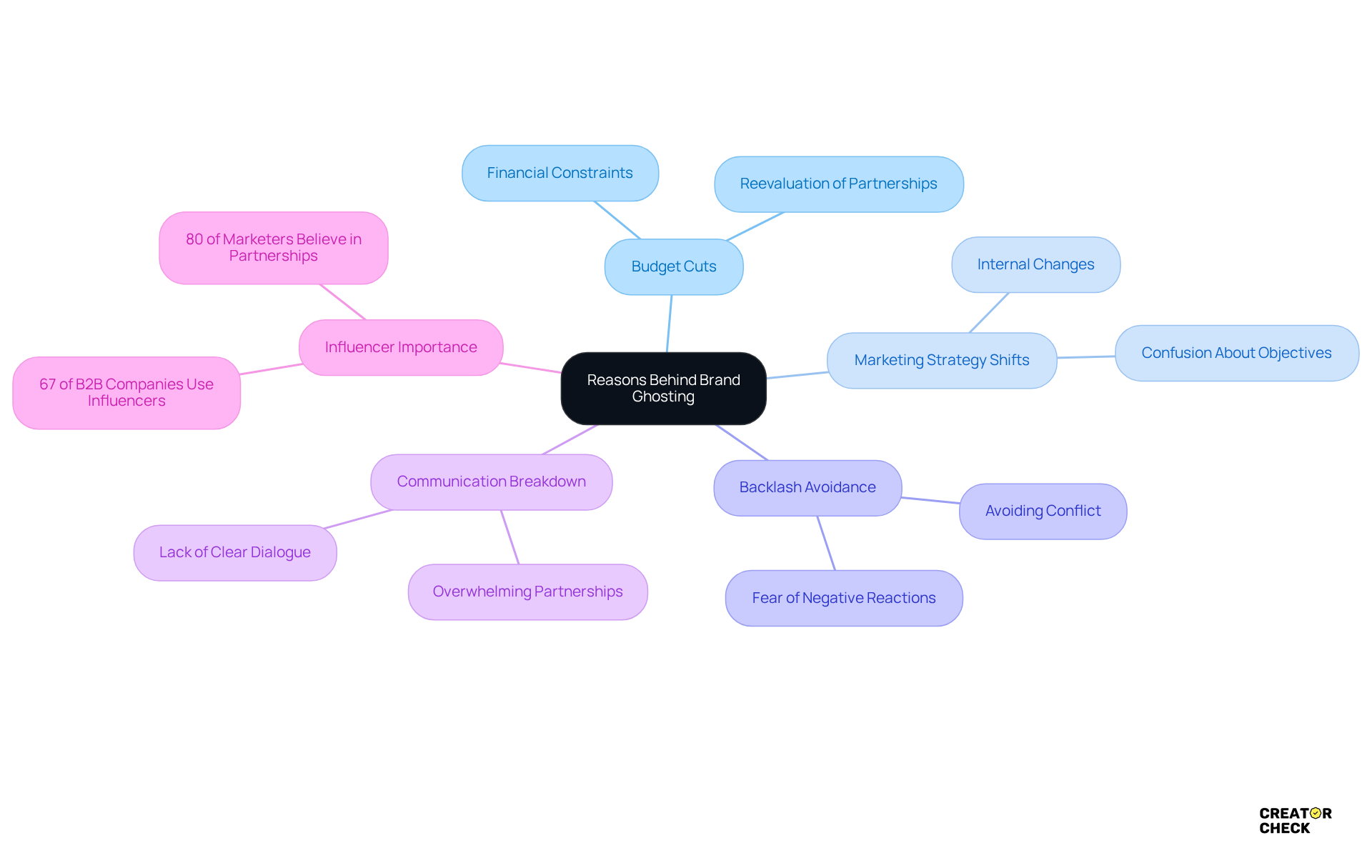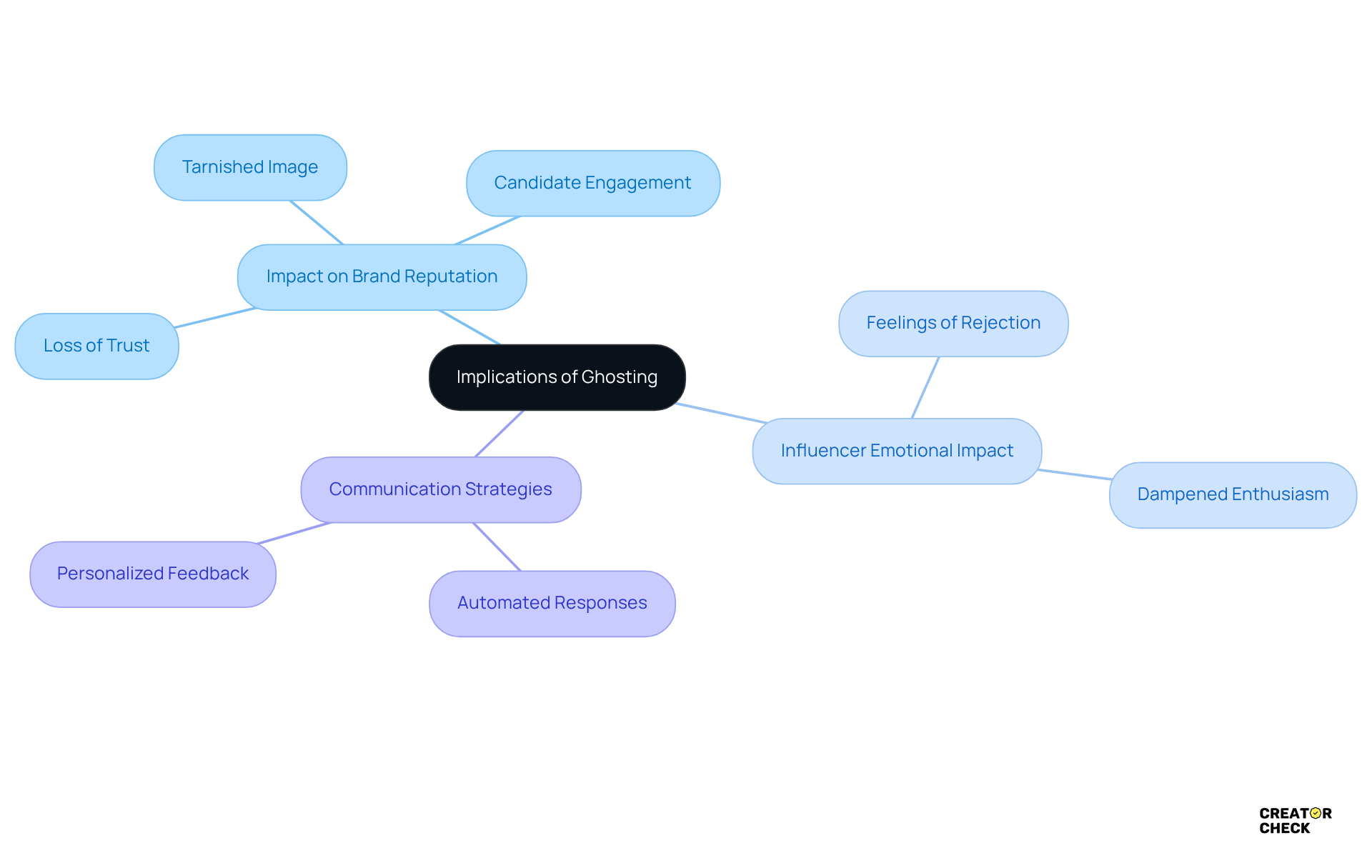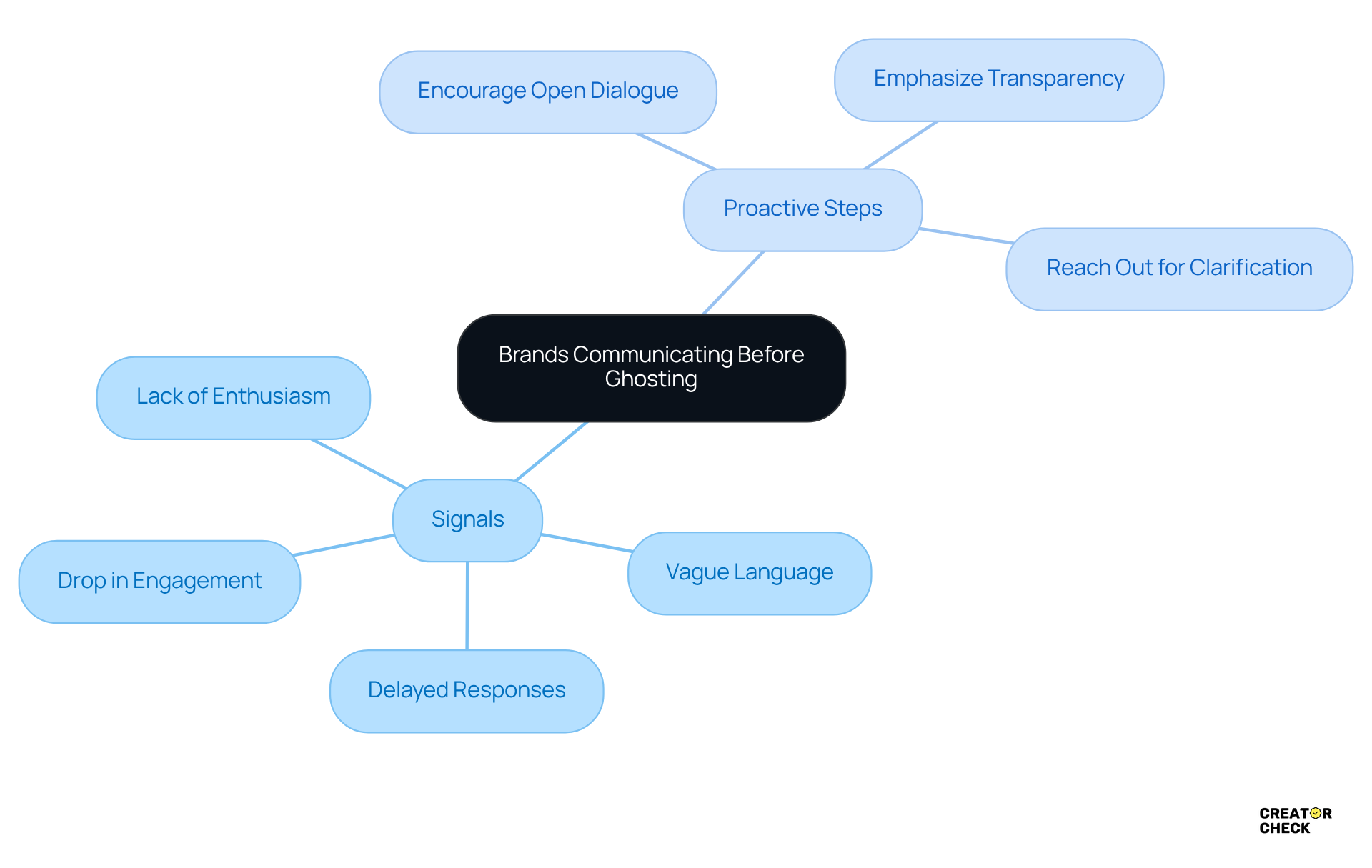Overview
So, let's talk about brand ghosting in influencer marketing! This article really dives into the key signals and implications of what happens when brands suddenly stop communicating. It highlights how brands often interact before they decide to ghost, and trust me, this can seriously hurt both their reputations and those of the influencers involved.
Keeping the lines of communication open is super important—it helps build strong partnerships and can really help avoid any negative fallout. Remember, healthy communication is key to making these relationships work!
Introduction
In the intricate world of influencer marketing, there's a trend that's been making waves: ghosting. You know, that moment when brands suddenly stop communicating? It’s not just a minor hiccup; it’s a real concern. This unsettling behavior doesn’t just throw a wrench in potential collaborations; it leaves influencers feeling uncertain and, let's face it, a bit betrayed.
As more companies dive into creator partnerships, it’s super important to pick up on the signs that might lead to ghosting. So, what’s behind a brand’s decision to go quiet, and how can influencers steer through these tricky waters to build better communication? Let’s explore this together!
Defining Ghosting in Brand Communication
In marketing communication, what brands say before ghosting an influencer or creator is when a company suddenly stops interacting without any explanation. This often happens after initial talks about potential collaborations or even during ongoing partnerships, showing up as silence in emails, messages, or calls. Such quietness can leave important figures feeling uncertain, which can really shake their trust and willingness to engage with the company down the line.
Statistics reveal that ghosting is a common issue in the creative world, affecting not just social media personalities but also photographers, writers, and designers. In fact, it’s become a significant concern among creatives, leading to emotional distress and uncertainty. The emotional toll of being ghosted can stretch for weeks or even months for freelancers, making it tough for them to plan projects and secure income. This lack of communication can erode trust and damage a company’s reputation, highlighting the need for organizations to step up their interaction practices.
For instance, an unnamed person from the influencer marketing sector shared stories about social media figures who cut off communication with companies after signing contracts, even abandoning major deals. This trend underscores what brands say before ghosting, emphasizing the importance of fostering open communication and professionalism in their relationships with influencers. As companies ramp up their budgets for creator marketing—92% plan to allocate more resources in 2024—the need for trustworthy partnerships becomes even more critical.
Given these challenges, experts suggest that brands should have policies in place to ensure that every inquiry gets a response, even if it’s just a polite rejection. As one anonymous source pointed out, 'A simple 'this isn’t within our budget' would be far better than complete silence.' This approach not only enhances communication but also respects the time and effort of key individuals, ultimately leading to healthier and more productive partnerships.

Reasons Behind Brand Ghosting: Motivations and Circumstances
Brands might ghost influencers for a bunch of reasons, often related to what brands say before ghosting due to internal shifts that shake up their marketing strategies. Budget cuts? Yeah, they’re a biggie. Financial constraints can really force a company to rethink its partnerships and what’s important. Then there are those shifts in marketing strategy that can leave everyone scratching their heads, creating confusion about what the objectives and goals even are. This kind of uncertainty can be overwhelming, especially when juggling multiple partnerships, leading to communication breakdowns.
Did you know that 67% of B2B companies are tapping into marketing through social media personalities to boost awareness? That really highlights how vital these collaborations are to their overall game plan.
Now, let’s talk about another angle. Companies might get nervous about potential backlash from influencers, which can make them want to just ghost instead of considering what brands say before ghosting during possibly awkward conversations. It’s a classic case of wanting to avoid conflict or thinking that addressing issues might just complicate things further. Interestingly, 80% of marketers believe that partnerships with social media figures are a win for business, yet many struggle with managing these relationships. And here’s a fun fact: 60% of companies are using external tools to help with their marketing through social media personalities, showing just how tricky things can get operationally.
As the influencer marketing scene keeps changing, it’s super important to understand what brands say before ghosting if you want to navigate partnerships effectively. By spotting the signs of potential ghosting, social media personalities can jump in and tackle issues head-on, encouraging a more open dialogue with companies. As Shameer Sachdev said, "Creator Check has the potential to eliminate reliance on disparate tools like spreadsheets and emails," which really underscores the need for smoother communication in these partnerships.

Implications of Ghosting: Effects on Brand and Influencer Relationships
Ghosting can really shake things up for both companies and social media personalities, highlighting what brands say before ghosting. For businesses, what brands say before ghosting can seriously harm their reputation. Content creators often share their negative experiences with their networks, leading to a tarnished image in the creator community. This loss of trust and credibility can make it tough to land future partnerships, which means companies might seem less appealing to potential collaborators. Did you know that nearly 40% of candidates are less likely to engage with a company that has previously ignored them? This really highlights what brands say before ghosting and the long-term effects in the marketing world.
On the flip side, influencers who experience ghosting might wrestle with feelings of rejection and frustration. This can dampen their enthusiasm to partner with other companies. It’s a tough emotional load that can create a negative atmosphere in influencer marketing, where open communication is key to building successful partnerships. As Sue Parker, Owner of Dare Group Australia, wisely points out, "Personal identities and business reputations are at risk," which emphasizes what brands say before ghosting and the importance of maintaining respectful dialogue.
Looking at some case studies, it’s clear that companies that prioritize clear interactions and timely follow-ups see a boost in their reputation and candidate experience. For instance, organizations that use automated responses and personalized feedback have built stronger relationships with key individuals. This reinforces the idea that proactive communication can really help lessen the negative impacts of ghosting. By recognizing the harmful effects of ghosting, brands can take steps to maintain positive connections with key individuals, paving the way for a healthier and more productive marketing ecosystem.

Recognizing the Signals: What Brands Communicate Before Ghosting
Brands often send out subtle signals, which reflect what brands say before ghosting influencers. You might notice things like delayed responses to your inquiries, vague or non-committal language in their messages, and a drop in engagement during your discussions. Have you ever felt a lack of enthusiasm or urgency from a brand? That can be a sign that their priorities are shifting. Recognizing these signals is super important, particularly regarding what brands say before ghosting, which has become a real concern in the influencer marketing world.
So, what can you do about it? Encouraging open dialogue and emphasizing transparency and professionalism can really help. Taking proactive steps, like reaching out for clarification or expressing your ongoing interest in collaborating, can make a big difference. This awareness can help you avoid the risk of being ghosted and foster healthier communication channels. Plus, with brands planning to boost their budgets for creator marketing in 2024, it’s a great time to strengthen those connections!

Conclusion
Ghosting in brand communication highlights a significant disconnect between companies and influencers. When brands suddenly stop communicating, it disrupts potential collaborations and erodes trust and credibility. This silence can leave a lasting impact, affecting both the emotional health of creators and the brands' reputations.
In this article, we’ve explored the reasons behind ghosting, the effects on both sides, and the crucial need for open communication. Factors like budget limits, changing marketing strategies, and fear of backlash all play a role in this troubling trend. But here’s the good news: companies can lessen the negative fallout from ghosting by putting clear communication policies in place and fostering respectful conversations with influencers.
So, what does this mean for you? Prioritizing proactive communication can really boost brand relationships and create a healthier marketing environment. Brands need to be aware of the signals they send and engage meaningfully with influencers. By doing this, they not only safeguard their reputation but also set the stage for more successful collaborations down the line. Embracing transparency and professionalism is key to navigating the complexities of influencer partnerships, ensuring that both parties can thrive together.
Frequently Asked Questions
What does "ghosting" mean in brand communication?
Ghosting in brand communication refers to a situation where a company suddenly stops interacting with an influencer or creator without any explanation, often after initial discussions about potential collaborations or during ongoing partnerships.
How does ghosting affect influencers and creators?
Ghosting can leave influencers and creators feeling uncertain, which may shake their trust and willingness to engage with the company in the future. It can also lead to emotional distress and uncertainty, impacting their ability to plan projects and secure income.
Is ghosting a common issue in the creative industry?
Yes, statistics indicate that ghosting is a common issue in the creative world, affecting various professionals including social media personalities, photographers, writers, and designers.
What are the potential consequences of ghosting for companies?
The lack of communication resulting from ghosting can erode trust and damage a company's reputation, highlighting the need for better interaction practices.
What do experts suggest brands do to avoid ghosting?
Experts recommend that brands implement policies to ensure that every inquiry receives a response, even if it is just a polite rejection. This approach enhances communication and respects the time and effort of influencers and creators.
What impact does increased budget allocation for creator marketing have on ghosting?
As companies plan to allocate more resources to creator marketing, the need for trustworthy partnerships becomes even more critical, making effective communication essential to avoid ghosting situations.




